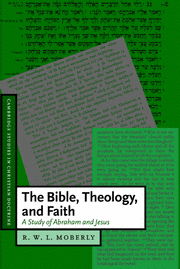Book contents
- Frontmatter
- Contents
- Preface
- 1 The Bible, the question of God, and Christian faith
- 2 Christ as the key to scripture: the journey to Emmaus
- 3 Abraham and God in Genesis 22
- 4 Ancient and modern interpretations of Genesis 22
- 5 Genesis 22 and the hermeneutics of suspicion
- 6 Jesus in Matthew's Gospel as Son of God
- 7 Summary and prospect
- References
- Index of scriptural references
- Index of names
- Index of subjects
3 - Abraham and God in Genesis 22
Published online by Cambridge University Press: 02 December 2009
- Frontmatter
- Contents
- Preface
- 1 The Bible, the question of God, and Christian faith
- 2 Christ as the key to scripture: the journey to Emmaus
- 3 Abraham and God in Genesis 22
- 4 Ancient and modern interpretations of Genesis 22
- 5 Genesis 22 and the hermeneutics of suspicion
- 6 Jesus in Matthew's Gospel as Son of God
- 7 Summary and prospect
- References
- Index of scriptural references
- Index of names
- Index of subjects
Summary
In the light of our preceding discussion of Christ as the key to scripture, how best should we proceed in actual engagement with Israel's scripture? I propose, for several interrelated reasons, to consider only one story – but that one story is the story of Abraham and Isaac in Genesis 22:1–19, one of the most memorable and resonant of all biblical stories (often conveniently referred to by its Jewish name, the Akedah).
For both Jews and Christians in their differing contexts (and differently again for Muslims, through the Qur'an), Genesis 22 has been one of those highpoints in scripture where the nature and meaning of the Bible as a whole is illuminated with unusual clarity. The story has served as an interpretative key to other parts of scripture, and has interacted with continuing post-biblical patterns of faith and life. It has an enormous history of reception, rooted in its intrinsic meaning. I wish to stand within that broad tradition.
Genesis 22 is also one of those stories within scripture which is regularly used as a focus for discussion of fundamental and wide-ranging issues of a theological and moral nature. Probably the most famous example of this is Kierkegaard's Fear and Trembling, but there is no shortage of other such discussions both before Kierkegaard and subsequently. This seems to me a thoroughly appropriate use of the text, to which I hope this present study may contribute in a small way.
Moreover, Genesis 22 features in recent scholarly work as a recurrent paradigmatic example for theories of interpretation, not least for Christian interpretations of the Old Testament.
- Type
- Chapter
- Information
- The Bible, Theology, and FaithA Study of Abraham and Jesus, pp. 71 - 131Publisher: Cambridge University PressPrint publication year: 2000



